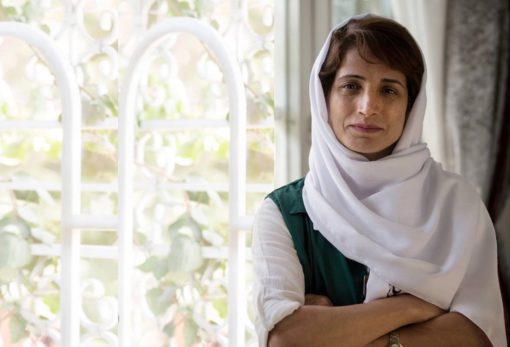
Prominent Iranian human rights lawyer and women’s rights defender, Nasrin Sotoudeh, was sent to prison on Monday for defending the women who were arrested for taking part in the anti-headscarf movement. The nature of her sentencing remains disputed. Some reports said that the sentence entails 33 years in prison and 148 lashes, but the Islamic Republic News Agency reported it to be seven years.
Sotoudeh is an outspoken critic of the Islamic Republic of Iran’s laws on women. The lawyer, who is currently in Tehran’s Evin prison, was arrested last year in June for representing a number of women and removing the headscarf as symbol of protest against the country’s mandatory Islamic dress code. She was earlier charged with “spying, spreading propaganda and insulting” Iran’s supreme leader, Ayatollah Ali Khamenei.
Over the past one decade, the human rights lawyer has been facing intimidation and false charges by the government. In the year 2018 and 2019, she has been charged with multiple cases related to national security offenses. In 2011, the Iranian court banned her from practicing law, as well as from travelling outside the country, for 20 years, along with 11 years imprisonment, which was later reduced to six years.
Following the Iranian revolution of 1979, the country has adherence to a “regressive” and compulsory Islamic dress code, especially for women. Women are not allowed to appear in public without wearing a headscarf or hijab. Further, the dress code dictates that women’s hair and body must be covered in public. Violation of the rule imposed by the country is a punishable offense. According to the Islamic Penal Code of Iran (1991), “women who appear in public without a proper hijab should be imprisoned from ten days to two months or pay a fine of 50,000 to 500,000 Iranian Rial (USD 1 to 12)”. The law is reportedly applicable to all Iranian women regardless of their religion.
Criticizing the rule of “reactionary clerics”, the Women’s Democratic Organization and the Tudeh Party of Iran noted that the regime has refused to change its regressive and anti-women attitude amid the increasing resistance by Iranian women.
The women’s movement continues to gain momentum in the country, demanding an end to the discriminatory laws and the protection of women’s rights.
In 2014, UK based journalist and author of The Wind in My Hair, Masih Alinejad, started an online campaign called My Stealthy Freedom. The journalist herself was in exile from Iran for breaking their mandatory rule of wearing hijab. However, her movement was much welcomed by the women residents of Iran, who demand their basic rights and their freedom of expression.
It has now been forty years since women came out on the streets, demanding a ban on the law. Over the past few years, the country has witnessed a new form of protest, especially by the women fighting for their basic freedom – their right to dress. Last year, in December, a woman took off her white headscarf in public against the compulsory law. In a video published by My Stealthy Freedom, several women, aware of the future repercussions, posted pictures of themselves taking the white scarf off their heads.




